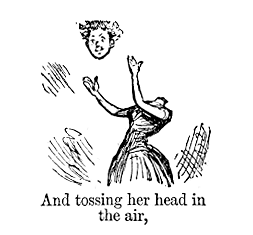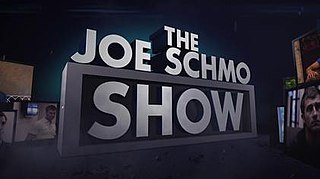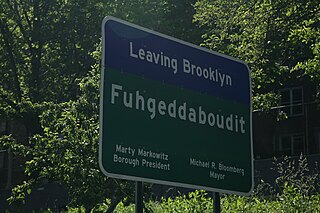Related Research Articles
Dialect refers to two distinctly different types of linguistic relationships.
African-American English is the set of English sociolects spoken by most Black people in the United States and many in Canada; most commonly, it refers to a dialect continuum ranging from African-American Vernacular English to a more standard American English. Like all widely spoken language varieties, African-American English shows variation stylistically, generationally, geographically, in rural versus urban characteristics, in vernacular versus standard registers, etc. There has been a significant body of African-American literature and oral tradition for centuries.

Western Pennsylvania English, known more narrowly as Pittsburgh English or popularly as Pittsburghese, is a dialect of American English native primarily to the western half of Pennsylvania, centered on the city of Pittsburgh, but potentially appearing in some speakers as far north as Erie County, as far west as Youngstown, Ohio, and as far south as Clarksburg, West Virginia. Commonly associated with the working class of Pittsburgh, users of the dialect are colloquially known as "Yinzers". The dialect is even heard in the town of Hancock, Maryland.
Knaanic is a tentative name for a number of West Slavic dialects or registers formerly spoken by the Jews in the lands of the Western Slavs, notably the Czech lands, but also the lands of modern Poland, Lusatia, and other Sorbian regions. They became extinct in the Late Middle Ages. Very little is known about their difference from the surrounding Slavic languages. The largest number of samples of Knaanic written in Hebrew script are in Czech; therefore, most commonly Knaanic is associated with Old Czech.

OK is an English word denoting approval, acceptance, agreement, assent, acknowledgment, or a sign of indifference. OK is frequently used as a loanword in other languages. It has been described as the most frequently spoken or written word on the planet.

A cliché is an element of an artistic work, saying, or idea that has become overused to the point of losing its original meaning or effect, even to the point of being weird or irritating, especially when at some earlier time it was considered meaningful or novel. In phraseology, the term has taken on a more technical meaning, referring to an expression imposed by conventionalized linguistic usage.

The Joe Schmo Show is an American reality television hoax show created by Paul Wernick and Rhett Reese. The series was broadcast in the U.S. on the cable network Spike. On December 10, 2012, Spike announced it was bringing The Joe Schmo Show back for a third season, which premiered on January 8, 2013.

John Q. Public is a generic name and placeholder name, especially in American English, to denote a hypothetical member of society, deemed a "common man", who is presumed to represent the randomly selected "man on the street".

Schmaltz is rendered (clarified) chicken or goose fat. It is an integral part of traditional Ashkenazi Jewish cuisine, where it has been used for centuries in a wide array of dishes, such as chicken soup, latkes, matzah brei, chopped liver, matzah balls, fried chicken, and many others, as a cooking fat, spread, or flavor enhancer.
Shm-reduplication is a form of reduplication originating in Yiddish in which the original word or its first syllable is repeated with the copy beginning with shm-, pronounced. The construction is generally used to indicate irony, sarcasm, derision, skepticism, or lack of interest with respect to comments about the discussed object. In general, the new combination is used as an interjection.
"A language is a dialect with an army and navy", sometimes called the Weinreich witticism, is a quip about the arbitrariness of the distinction between a dialect and a language. It points out the influence that social and political conditions can have over a community's perception of the status of a language or dialect. The facetious adage was popularized by the sociolinguist and Yiddish scholar Max Weinreich, who heard it from a member of the audience at one of his lectures in the 1940s.
Matt Kennedy Gould is an American former television personality. He rose to prominence in 2003, when he was the protagonist of The Joe Schmo Show, a fake reality show in which, unbeknownst to him, all the participants but Gould were actors portraying broad reality show participant archetypes.
"Chim Chim Cher-ee" is a song from Mary Poppins, the 1964 musical film, and is also featured in the 2004 Mary Poppins musical.
Jewish English is a cover term for varieties of the English language spoken by Jews. They may include significant amounts of vocabulary and syntax taken from Yiddish, and both classical and modern Hebrew. These varieties can be classified into several types: Yeshivish, Yinglish, and Heblish, as well as more flexible mixtures of English and other Jewish languages, which may contain features and other elements from languages other than Yiddish and Hebrew.
Bamboo English was a Japanese Pidgin-English jargon developed after World War II that was spoken between American military personnel and the Japanese on US military bases in occupied Japan. It has been thought to be a pidgin, though analysis of the language's features indicates it to be a pre-pidgin or a jargon rather than a stable pidgin.
Schmuck, or shmuck, is a pejorative term meaning one who is stupid or foolish, or an obnoxious, contemptible or detestable person. The word came into the English language from Yiddish, where it has similar pejorative meanings, but where its literal meaning is a vulgar term for a penis.
Meh is a colloquial interjection used as an expression of indifference or boredom. It is often regarded as a verbal equivalent of a shrug of the shoulders. The use of the term "meh" shows that the speaker is apathetic, uninterested, or indifferent to the question or subject at hand. It is occasionally used as an adjective, meaning something is mediocre or unremarkable.

The Jewish Socialist Federation (JSF) was a secular Jewish Yiddish-oriented organization founded in 1912 which acted as a language federation in the Socialist Party of America (SPA). Many of the founding members of the JSF had previously been members of the Bund in Eastern Europe and sought to bring Bundist politics to the socialist movement in the USA.

The sound system of New York City English is popularly known as a New York accent. The New York metropolitan accent is one of the most recognizable accents of the United States, largely due to its popular stereotypes and portrayal in radio, film, and television. Several other common names exist for the accent that associate it with more specific locations in the New York City area, such as "Bronx accent", "Brooklyn accent", "Queens accent", "Long Island accent", and "North Jersey accent"; however, no research has demonstrated significant linguistic differences between these locations.
References
- ↑ Feinsilver, Lillian Mermin (1956), "Schmo, Schmog, and Schnook", American Speech, vol. 31, no. 3, Duke UP, pp. 236–37, JSTOR 453695 .
- ↑ Gold, David L. (1988), "Review of Yiddish and English: A Century of Yiddish in America by Sol Steinmetz", American Speech, vol. 63, no. 3, Duke UP, pp. 276–282, doi:10.2307/454825, JSTOR 454825